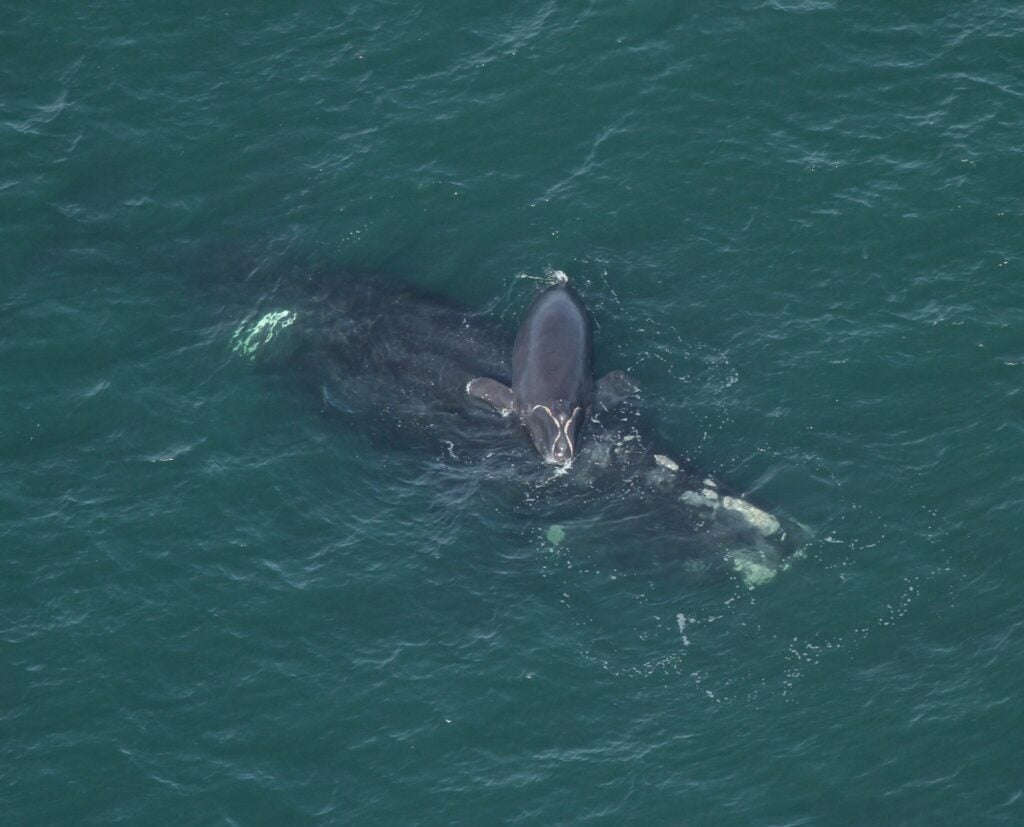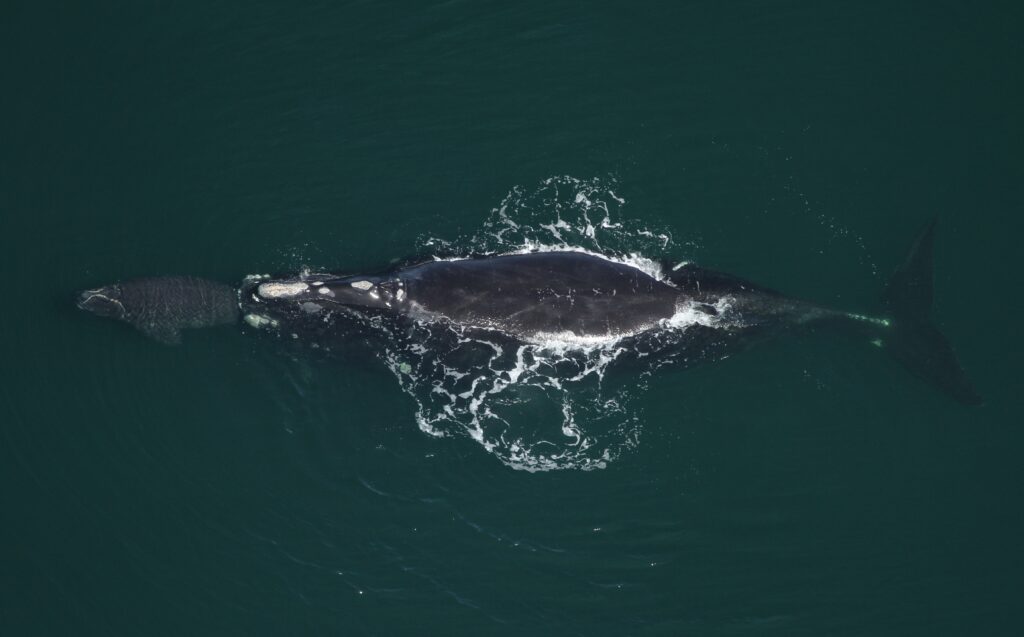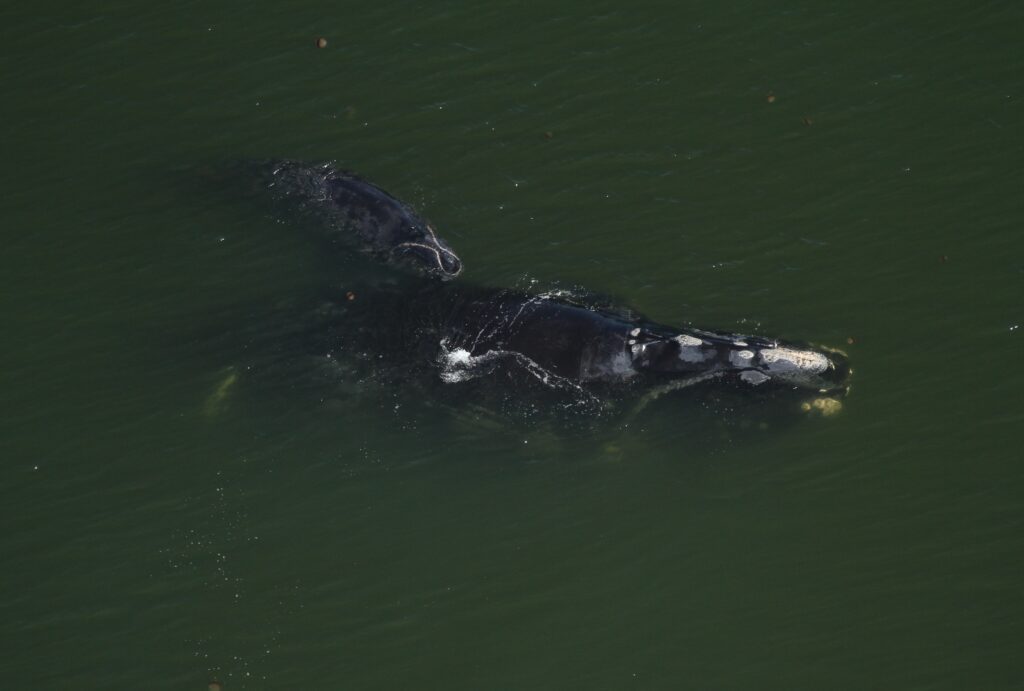December 19, 2023
Calvin: The story of survival for one critically endangered right whale
Estimated reading time: 0 minutes
BY: Sydney Cross
Topics:
In the cold, deep waters of the North Atlantic, Delilah, a critically endangered North Atlantic right whale navigates speeding ships and a jungle of fishing lines as she travels north on her hunt for food. She was first sighted in the Bay of Fundy, between Nova Scotia and New Brunswick, but these waters have witnessed her countless journeys.
In 1992, born under the winter sun and bathed in the warmth of the southern U.S. waters, Delilah gave birth to a female calf, Calvin. Canadian summer waters are teeming with plankton, a bounty to nourish the growing calf, and so the two started their migration north together. A right whale mother like Delilah will stay with her calf for the first year or two of their lives, nursing, guiding and protecting them.

When her calf was only eight months old, Delilah was struck by a large ship. Boaters who witnessed the strike said the blunt force did not cause immediate death, instead, she violently thrashed with Calvin at her side until she hemorrhaged and died. With no mother to protect her and no milk to help her grow, Calvin’s chances were slim. But against all odds, she survived. Her independence and amusing behaviour earned her the name Calvin, after the comic strip Calvin and Hobbes.
As Calvin grew, she continued to face the same challenges that all critically endangered North Atlantic right whales face, threatening the survival of this species – ship strikes and entanglements. In 2000, Calvin was spotted entangled in fishing ropes. These strong ropes can wrap around a whale’s mouth, fins, tail and bodies. Because they are so strong, some right whales can free themselves from entanglements. But for those that cannot, it is a slow and painful death. On average, it can take a large whale six months to die when lethally entangled. The ropes tighten over time, cutting into their flesh and bones and leading to life-threatening infections and hemorrhages, while fins and tail flukes are often totally or partially amputated. This can slow a whale down, making it difficult to find food, swim and, in some cases, breathe. While some starve, others drown.
Luckily for Calvin, her story doesn’t end here. She was rescued by the Center for Coastal Studies. Based her scars, researchers believe this wasn’t her first entanglement. Analysis showed that her first entanglement occurred before she had reached the Bay of Fundy for the first time – when she was just a newly orphaned eight-month-old calf.
Since then, Calvin has been through a total of six entanglements, and her body bears the scars of these experiences.

In 2004 Calvin had her first calf, Hobbes, and as her mother did 13 years before, she brought her calf to the Bay of Fundy. Calvin had her second calf in 2009 and she has had two more since then. Eighty-nine per cent of North Atlantic right whales will face entanglement in their lives and nearly 60 per cent will be entangled more than once. Without urgent action from the Canadian government, her calves will face the same dangers she endured.
Calvin’s story is one of resilience and survival. She has experienced the threats of vessel strikes and entanglements and continues to prove the strength of these incredible whales. Calvin has faced a lot of despair in her life but unfortunately, this is the current reality of co-existing with humans.
Between 2003 and 2018, of all the North Atlantic right whale deaths where a cause could be determined, not a single one was from natural causes.
But it doesn’t have to be this way. Currently, measures to protect right whales in Canada are created annually and can be changed or stopped at any time by the government. Protecting this species is a long-term challenge that requires a permanent solution.
In 2024, Oceana Canada will continue to advocate for North Atlantic right whales like Calvin. You can support our work by making a donation at Oceana.ca/Donate.


